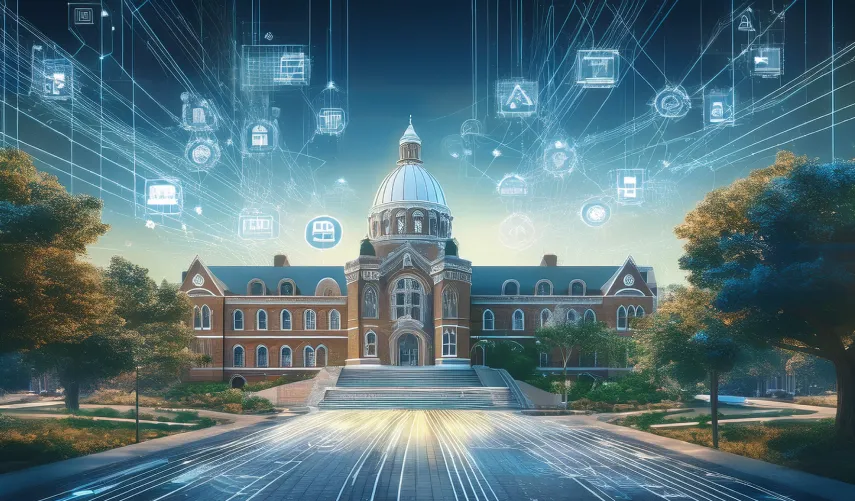
EAB Thought Leadership
Your Institution’s AI-Enabled Future
By Dr. Celeste Schwartz, CIO (retired) and AI
As a newly retired CIO with over 40 years of experience in higher education, I’ve had the privilege of witnessing the profound impact technology can have on how colleges operate and support their students. Artificial intelligence (AI) isn’t just another passing trend—it’s here to stay, and it’s reshaping the future of higher education in ways that will drive innovation, enhance academic offerings, and streamline institutional operations. If you’re in higher education today, integrating AI into your strategy isn’t just a matter of keeping pace—it’s about positioning your institution for long-term success in a rapidly changing world.
Let’s explore some practical, actionable ways AI can give your institution a competitive edge while making life easier for both your teams and your students.
1) Enhancing Course Development with AI
AI can significantly enhance how courses are developed and delivered. Think about all the tasks involved in course creation: mapping content, designing media, and developing engaging material for students. AI can help streamline these processes, enabling faculty to focus on refining the learning experience.
AI-powered platforms can analyze student engagement data and help instructors identify which parts of a course are challenging for students. Faculty can then make adjustments in real-time, ensuring that content meets student needs and improves their learning outcomes. AI tools also help faculty spot trends, whether it’s across the whole class or for individual students, so that interventions can happen sooner rather than later. This means students get the support they need, and faculty gain more time to focus on what they do best—teaching.
2) Personalized Learning & Accessibility: Meeting Students Where They Are
One of the most exciting applications of AI is personalized learning. Every student learns differently, and AI can adapt the content delivery method to fit each student’s unique needs. This is a huge benefit for students, as it ensures that they receive the information in a way that makes sense for them—whether through visual aids, interactive exercises, or reading-based materials.
AI also makes a difference when it comes to accessibility. Many students with disabilities struggle to access traditional content. AI can automatically adjust materials and assessments based on each student’s specific requirements, creating a more inclusive environment. This ensures that all learners have an equal chance to succeed.
3) Streamlining Recruitment with AI
AI is already proving to be a powerful tool in recruitment, and this is where I’ve seen institutions save both time and resources. AI-driven analytics can help colleges target specific student demographics based on factors like academic interests, location, and even socioeconomic status. This kind of precision means your recruitment efforts are focused and much more effective.
Additionally, AI-powered chatbots are becoming the unsung heroes of recruitment. Available 24/7, these bots answer prospective students’ questions, guide them through the application process, and provide reminders about deadlines. This personalized interaction ensures that students get the information they need quickly, without adding extra pressure on your staff.
4) Boosting Retention with AI Insights
Retention is a top priority for any institution, and AI can help you spot at-risk students earlier than traditional methods. By tracking attendance, grades, and engagement, AI can identify patterns that indicate when a student may need additional support. This early detection allows for timely interventions, helping students stay on track and succeed.
For example, AI might notice that a student hasn’t been participating in online discussions or is consistently missing classes. With this information, your advising team can reach out and provide the necessary resources to help the student get back on track. It’s all about being proactive rather than reactive—and AI can make this happen.
5) Optimizing Efficiency
AI doesn’t just benefit students and faculty; it also helps the bottom line. By optimizing processes, AI reduces the strain on resources and helps institutions allocate them more effectively. One example is identifying high-demand courses through AI-driven insights based on enrollment trends, waitlist data, and student feedback. This allows institutions to plan their course offerings efficiently, meeting student demand while managing costs.
On the administrative side, AI can automate routine tasks like scheduling, research allocation, and compliance monitoring. This frees up staff to focus on more strategic initiatives, reducing operational costs while maintaining or improving the quality of services.
6) Powering Immersive Learning Experiences
The future of higher education lies in immersive learning, and AI is leading the charge. AI-driven virtual reality (VR) and augmented reality (AR) platforms create interactive simulations that can place students in real-world scenarios. Imagine students studying history by virtually exploring ancient civilizations or conducting a simulated science experiment. These experiences deepen understanding and provide a hands-on approach to learning that traditional methods simply can’t match.
Institutions that embrace these technologies will offer unique learning experiences that appeal to a broader audience, helping them stand out in a crowded market.
Looking to the Future
The possibilities with AI are just getting started. As it continues to evolve, we can expect more sophisticated adaptive learning platforms and AI-driven advising systems. Predictive analytics will allow institutions to make data-driven decisions, anticipating challenges and opportunities before they arise.
Student support services, from tutoring to mental health care, will increasingly benefit from AI interventions, providing personalized assistance when students need it most. But with these advancements come challenges. Institutions must navigate issues around data accuracy, privacy, security, and the ethical use of AI. It’s critical to establish clear guidelines to protect student information while balancing AI’s potential benefits.
Integrating AI into Your IT Strategic Planning
If you’re serious about leveraging AI, it’s important to make it part of your institution’s broader IT strategic plan. Don’t think of AI as a separate initiative. It should align with your overall goals—whether those are improving student success, increasing operational efficiency, or driving innovation.
Work closely with your IT team to ensure AI initiatives are integrated into your institution’s infrastructure in a way that supports long-term growth. Be flexible and open to evolving technologies, but always keep your focus on the student experience and institutional goals.
AI offers immense potential, and now is the time to embrace it. Whether through personalized learning, improving recruitment and retention, or driving innovation, AI can make a profound impact on your institution. By integrating it into your IT planning and thinking strategically, you’ll be well-positioned to offer students the best possible education while ensuring your institution thrives in an increasingly digital world.
This content is part of a series that explores the impact and implications of AI in higher education, created through a collaboration between a human subject matter expert and a large language model.


